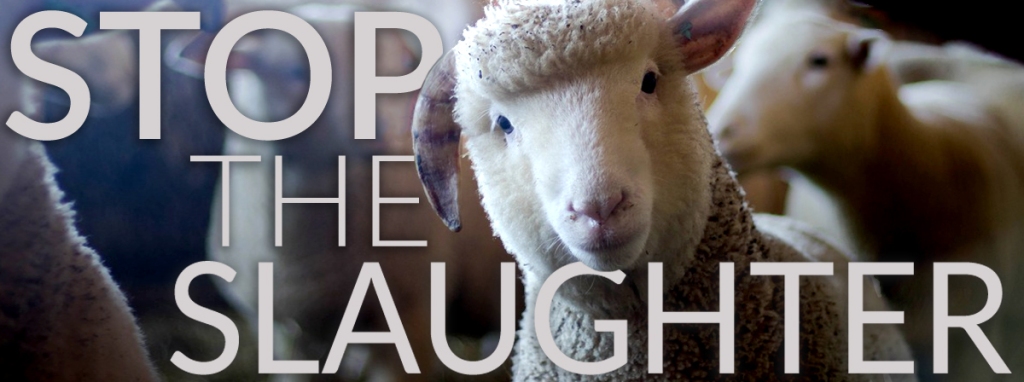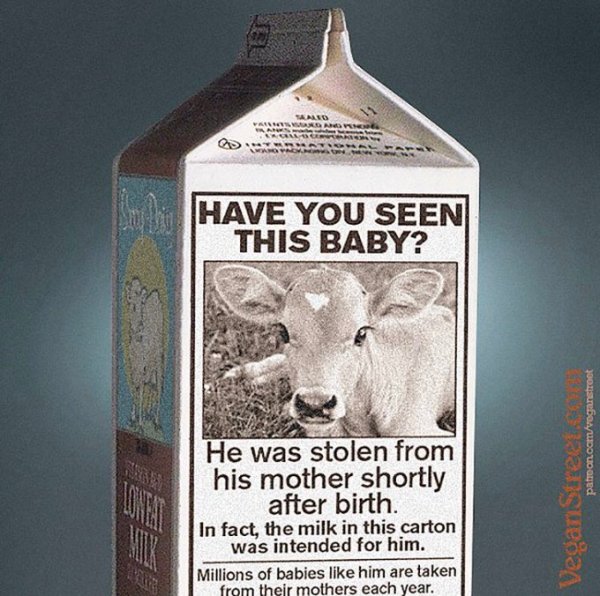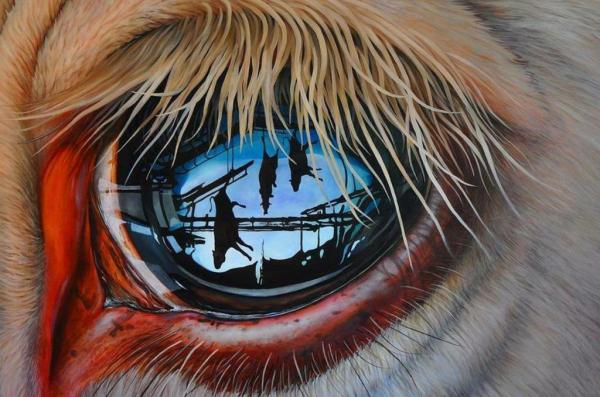Social scientists call on organizations that promote empathy and compassion to include animals

Wikimedia Commons
Source The Dodo: For the Love of Animals
By Katrina Fox
Dr Melanie Joy, Dr Will Tuttle, Jeffrey Masson, Dr Jonathan Balcombe and Professor Casey Taft are among more than 30 leaders in social sciences who have signed an open letter urging institutions whose work focuses on empathy and compassion to overcome their blind spot when it comes to nonhuman animals.
Stanford’s Center for Compassion and Altruism Research and Education, the Greater Good Science Center at Berkeley, and the The Dalai Lama Center for Ethics and Transformative Values at MIT are among a group of 12 organizations targeted in an open letter calling for them to include all sentient beings in their work and mission.
The letter, spearheaded by vegan Maryland-based psychotherapist and social worker Beth Levine, and including signatures from several luminaries in the animal advocacy movement, highlights ways in which cultural norms position nonhuman animals either as commodities to be exploited for our pleasure, or as having interests ‘less than’ those of humans. It also points out that these social norms negatively impact not only nonhuman animals, but ourselves and our societies.
“We know that compassionate action leads to happier, more fulfilling lives, as well as an increase in mental, emotional and physical well-being and contributes to a less violent world. Imagine how much happier and emotionally and physically healthy individuals would be and how much more peaceful society would be if we all expanded our moral consideration to include all animals, human and nonhuman,” the letter says.
Sentience is at the heart of our moral code of conduct, according to Levine. “Sentience means that individuals experience various emotions including pleasure, pain, and fear and is aware of what is happening to and around themselves,” she says. “Unfortunately, despite the understanding that animals other than humans are sentient, the reality is that many humans treat nonhumans as things that we can do whatever we want with; use as resources, whether for food, clothing, entertainment, product testing, or vivisection.”
Levine, who has worked in the field of mental health for over 20 years and who has a keen interest in intersectionality in social justice, believes organizations that promote empathy and compassion need to fight against these cultural norms that see animals as commodities to be exploited and include all sentient beings when promoting empathy and compassion.
“Do unto others as you would have them do unto you does not depend on race, gender, sexual orientation or species,” she says. “If these organizations were true to their mission, they would be advocating that we treat all animals, human and nonhuman, as individuals whose lives matter to them.”
The letter includes signatories from 33 leading social scientists in the US, UK and Australia, including:
- Dr Melanie Joy, Professor, University of Massachusetts
- Professor Casey Taft, Professor, Boston University School of Medicine, Boston, Massachusetts
- Dr Richard Ryder, psychologist, author, coined the term ‘speciesism’ in 1970
- Dr Will Tuttle, author of The World Peace Diet
- Dr Jonathan Balcombe, author of Second Nature: The Inner Lives of Animals
- Nik Taylor, Associate Professor, School of Social and Policy Studies, Flinders University, Australia
- Jeffrey Masson, author of When Elephants Weep
- Dr Richard Twine, Senior Lecturer in Social Sciences, Edge Hill University, UK
- Dr David Nibert, Professor of Sociology, Wittenberg University, Ohio
- Dr Carol L. Glasser, Assistant Professor of Sociology, Minnesota State University
Open Letter to Organizations that Research and Promote Empathy and Compassion
· Center for Compassion and Altruism Research and Education (http://ccare.stanford.edu/tag/ccare/)
· Center for Investigating Healthy Minds at the Waisman Center (http://www.investigatinghealthyminds.org/)
· Charter for Compassion (http://charterforcompassion.org/global-compassion-movement)
· The Compassionate Mind Foundation (http://www.compassionatemind.co.uk/index.htm)
· World Suffering & Compassionate Relief of Suffering [Compassionate Societies] (http://www.compassionatesocieties.org/)
· The Dalai Lama Center for Ethics and Transformative Values (http://thecenter.mit.edu/)
· Facing History and Ourselves (https://www.facinghistory.org/)
· Greater Good Science Center (http://greatergood.berkeley.edu/)
· Interdisciplinary Program on Empathy and Altruism Research (http://www.ipearlab.org/)
· Program on Empathy Awareness and Compassion in Education (http://www.prevention.psu.edu/projects/PEACE_Area2.html)
· Roots of Empathy (http://www.rootsofempathy.org/)
· Start Empathy (http://startempathy.org/
Full text of letter and signatories courtesy of Beth Levine’s Blog:
We are writing to ask for your help to make the world even kinder and more just.
You are an important change-maker. You and your organization are working to strengthen empathy and compassion towards people. These qualities are our most valuable resources because they are at the heart of a peaceful, caring, and just society and they connect us to others regardless of potential divisive differences. As such, we are requesting that you honor the essence of compassion by including nonhuman animals in your missions.
In the following few paragraphs, we will make the case for promoting compassion for all and following that we present a suggestion as to how your organization can help.
Sentience
Sentience is the ability to experience various emotions including pleasure, pain, and fear to have an innerlife, to be aware of what is happening to and around one’s self.
Importantly, humans are not the only living beings who are sentient. Marc Bekoff, cognitive ethologist, writes in LiveScience: “Yes. Scientists do have ample, detailed, empirical facts to declare that nonhuman animals are sentient beings.” Those of us who spend time with nonhuman animals, whether we share our lives with dogs or cats, volunteer with wildlife rescue organizations, work at farm sanctuaries caring for rescued cows, pigs, and chickens, or conduct field research know animals are have feelings common to us humans.
Empathy and Compassion
Research, such as that reported in Kate Stewart and Matthew Cole’s book, Our Children and Other Animals: The Cultural Construction of Human-Animal Relations in Childhood, shows how children have a great capacity for empathy for and desire to protect nonhuman animals and how we, as a society teach our children a separate morality for animals used for food. This is evidenced by children’s affinity for many nonhuman animals. Our social norms often pressure children and adults to disconnect from their empathy and compassion for other animals. And that is shown by our media and food traditions. An example is the 4-H club which result in children disconnecting from their feelings of attachment to animals they raised in order to bring these helpless creatures to the auction house before they are slaughtered.
Unfortunately, the reality is that many humans treat other animals as widgets; resources for our use, whether for food, clothing, entertainment, product testing, or vivisection, as opposed to treating other animals as individuals whose lives matter to them, just as our lives matter to us. Our cultural norms position nonhuman animals either as commodities to be exploited for our pleasure, or certainly as having interests “less than” those of humans.
Thanks to the work of social scientists we know that compassionate action leads to happier, more fulfilling lives, as well as an increase in mental, emotional and physical well-being and contributes to a less violent world. Imagine how much happier and emotionally and physically healthy individuals would be and how much more peaceful society would be if we all expanded our moral consideration to include all animals, human and nonhuman.
Our Suggestion for Action
Institutions such as yours are integral to helping our world be a safe and just place for all. Some organizations, such as Institute for Humane Education, YEA Camp, and The Kerulos Center already promote moral consideration for all sentient beings, both human and nonhuman. We are asking you to expand your horizons to include all sentient beings in your missions. This means, for example, researching how our social norms of treating nonhuman animals as commodities affect our well-being on an individual and societal level and how these norms affect the other living creatures on our planet and the planet itself. Providing empathy and compassion toward all sentient beings, especially those who are vulnerable and without social privilege, is precisely the practise required to make the world a better place.
We welcome your response. For further information, contact Beth Levine at BethLCounseling@aol.com.
Beth Levine, LCSW-C
Psychotherapist
Rockville, Maryland
Jonathan Balcombe, PhD
Director for Animal Sentience, Humane Society Institute for Science and Policy
Washington, DC
Matthew Cole, PhD
Sociologist
Honorary Associate and Associate Lecturer
Open University, UK
David Coles
Counsellor and Depression and Anxiety Specialist
Australia
William Crain, PhD
Professor
Department of Psychology
The City College of New York
New York, New York
Theonyl A. Cuevas, LCSW
Quality Assurance Consultant
New York, New York
Margo DeMello, PhD
Program Director, Human Animal Studies
Animals and Society Institute
Albuquerque, New Mexico area
Beatrice M. Friedlander, J.D., B.A. (Sociology)
Board of Directors, Animals and Society Institute, Inc.
Ann Arbor, Michigan area
Lori B. Girshick, PhD
Sociologist, Writer
Chandler-Gilbert Community College, Chandler, Arizona
Carol L. Glasser, Ph.D.
Assistant Professor of Sociology
Minnesota State University, Mankat
Sandra Higgins BSc (Hons) Psych, MSc Couns Psych, MBPsS
Counselling Psychologist
The Compassion Foundation of Ireland
Ireland
Melanie Joy, PhD
Professor, University of Massachusetts, Author, President, Beyond Carnism
Boston, Massachusetts
April Lang, LCSW-C
Writer, Psychotherapist
New York, New York
Amie Laporte, Masters, Development Psychology
Maryland
Heidi Leabman, LCSW, SEP
Somatic Psychotherapist
New York, New York
Dr Frank Malone
Psychoanalyst
Greater Philadelphia Area
Clare Mann, Psychologist
Australia
Jeffrey Moussaieff Masson, PhD
Author
Australia
Kelly Struthers Montford, MA
PhD Candidate
SSHRC Canada Graduate Scholar
Department of Sociology
PhD Trainee | Faculty of Nursing
University of Alberta, Canada
David A. Nibert, PhD
Professor of Sociology
Wittenberg University
Springfield, Ohio
Dr Tracie O’Keefe DCH, BHSc, ND
Psychotherapist, Australia
Kay Peggs, PhD
Reader in Sociology
University of Portsmouth, UK
Richard D. Ryder, PhD
University of Edinburgh, Diploma in Clinical Psychology
University of Cambridge, PhD in Social and Political Sciences
UK
John Sanbonmatsu, Ph.D.
Associate Professor of Philosophy
Department of Humanities and Arts
Worcester Polytechnic Institute
Worcester, Massachusetts
Jack Sawyer, M.Div, Ph.D.
Parker Street Foundation
San Francisco, California
Casey Taft, Ph.D.
Professor, Boston University School of Medicine
Boston, Massachusetts
Chloe Taylor
Assistant Professor
Department of Women’s and Gender Studies
Department of Philosophy
University of Alberta
Alberta, Canada
Nik Taylor
Associate ProfessorSchool of Social and Policy Studies
Flinders University, Australia
Lee Ann Thill, MA, ATR-BC, LPC
Art Therapist, Professional Counselor, Educator
Greater Philadelphia Area
Lisa Tolhurst (Lily), LPC MA MS NCC
Psychotherapist, Educator
Tucson, Arizona
Will Tuttle, PhD
Graduate School of Education
University of California, Berkeley
California
Richard Twine, Ph.D.
Senior Lecturer in Social Sciences
Department of Social Sciences & Co-Director of the Centre for Human Animal Studies
Edge Hill University
Ormskirk, UK
Order a FREE vegan kit: http://www.peta.org/living/food/free-vegan-starter-kit/
Take PETA’s Cruelty-Free Shopping Guide along with you next time you head to the store! The handy guide will help you find humane products at a glance. Order a FREE copy HERE
Want to do more than go vegan? Help others to do so! Click on the below for nominal, or no, fees to vegan literature that you can use to convince others that veganism is the only compassionate route to being an animal friend.
PETA: http://www.petacatalog.com/catalog/Literature-39-1.html
Looking for merchandise? Action for Animals has a very good sele : http://store.afa-online.org/home.php?cat=284
Have questions? Click HERE
a world of kindness
that we need
success is measured
by compassion,
not by greed.
Karen Lyons Kalmenson













































We are forced into a material body… with limitations and a shot enough life which should be focused entirely to compassion and respect for every living creature, without forgetting our Great Mother Earth.
Being buddhist I do firmly believe that karma and the law of cause-effect, if explained to all the humans, could give a great impact by making them change behaviour.
Unfortunately the buddhist path is seeing as a religion, which isn’t…
Thank you for sharing those informations and addresses!
I wish you lovely seasons holiday. :-)c
LikeLiked by 3 people
Thank you so much, dearest Claudine, very well said. I wish you the same. ❤
LikeLiked by 1 person
a world of kindness
that we need
success is measured
by compassion,
not by greed.
LikeLiked by 3 people
Love it so much. Thank you, hon, it’s perfect.
LikeLiked by 1 person
you are so very welcome and thank you♥
LikeLike